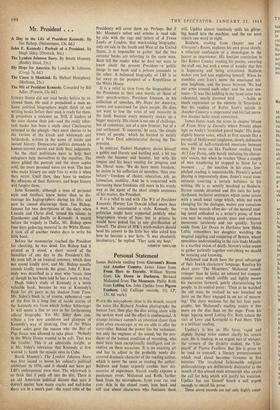Mr. President . . .
SYDNEY SMITH did not read books before he re- viewed them. He said it prejudiced a man so. Some political biographers might think of not writing books before their man is ready for them. It prejudices a reviewer so. Still, if leaders of the state choose their job—and the really reluc- tant leader has been a myth since Cincinnatus returned to the plough—they must choose to be the victims of the kitsch and whitewash and balderdash, written in the name of inside and instant history. Democratic politics demands its human-interest stories and daily final judgments.
So the chief politicians have to help their eulogisers help themselves to the royalties. The more gilded the portrait and the more copies sold, the more personal votes are won. The men who make history are only free to write it when they retire. Until then, they have to endorse the effusions of their flatterers, and hope history will forgive them.
John Kennedy, although a man of personal style and intellect, knew better than to dis- courage his hagiographers during his life; and now he cannot discourage them. Jim Bishop, famous for two descriptions of the days when Lincoln and Christ died, turned his talents to Eisenhower and finally to Kennedy. A month before the tragedy in Dallas, Mr. Bishop spent four days gathering material in the White House; it took all of another twelve days to write his little book.
Before the manuscript reached the President for checking, he was dead. Jim Bishop had it printed as it stood, a short record of the banalities of one day in the President's life. He even left in an ironical sentence, which does not sound kindly now, and Mr. Bishop usually sounds kindly towards the great. John F. Ken- nedy was described as a man who 'treats time as though he has been told he has a week to live.'
Hugh Sidey's study of Kennedy is a more valuable book, because he was at Kennedy's flank for six years as his shadow from Time. Mr. Sidey's book is, of course, ephemeral—one of the first in a long line of inside stories of the Kennedy era from which Arthur Schlesinger Jr will quote a line or two in his forthcoming official . biography. Yet Mr. Sidey does con- tribute a few new anecdotes and glimpses of Kennedy's way of thinking. One of the White House aides gave the reason why the Bay of Pigs fiasco was allowed to take place: 'Nobody in the White House wanted to be soft. That was the trouble.' This is an admirable insight, as is Mr. Sidey's relevation that Kennedy at first wanted to bomb the missile sites in Cuba.
Booth Mooney's The Lyndon Johnson Story was first issued to boom his subject's political ambitions in 1956, and it should not have got LBJ's endorsement even then. The whitewash is so thick that it peels off into the dirt. There is an old American political dictum that says it doesn't matter how many cracks and nail-holes there are in a man's past--the royal robe of the
Presidency will cover them up. Perhaps. But if Mr. Mooney's velvet and ermine is read side
by side with the rags and tatters of A Texan Looks at Lyndon, that muckraking biography, only on sale in the South and West of the United
States, it is impossible to gather that the two extreme books arc referring to the same man. Both tell the reader what he does not want to know about the present President—a public image in one book and a private innuendo in the other. A balanced biography of LBJ is as far away as the prospect of a Republican in the White House.
It is a relief to turn from the biographies of the Presidents to their own words, or those of their speech-writers. President Johnson, in his collection of speeches, My Hope for America, comes out concerned for plain people. He does not want to lose the votes of any minority in the land; because every minority makes up a bigger majority. His vision is not one of challenge, but of consensus; not of a new frontier, but of a just settlement. `It concerns,' he says, `the simple wants of people,' which he learned to satisfy as a New Deal administrator during the De- pression.
In contrast, Hubert Humphrey shows himself a gabby and literate and battling soul, a bit too much the boomer and booster, but with his tongue and his heart rooting for progress and the liberal team. 'We do have more freedom,' he insists in his collection of speeches, `than ever before'—freedom of choice, education, job, in- formation, mobility. And he is concerned with increasing these freedoms still more in his wordy way as the agent of the short simple sentences of his master, the President.
It is a relief to end with The Wit of President Kennedy. Harvey Lee Oswald killed more than a man, he assassinated a style. Kennedy the politician might have supported publicly what biographers wrote of him; but in private he would have poked fun at any glorification of himself. The drove of JFK's myth-makers should heed his answer to the little boy who asked him how he became a war hero. 'It was absolutely involuntary,' he replied. 'They sank my boat.'
ANDREW SINCLAIR






































 Previous page
Previous page